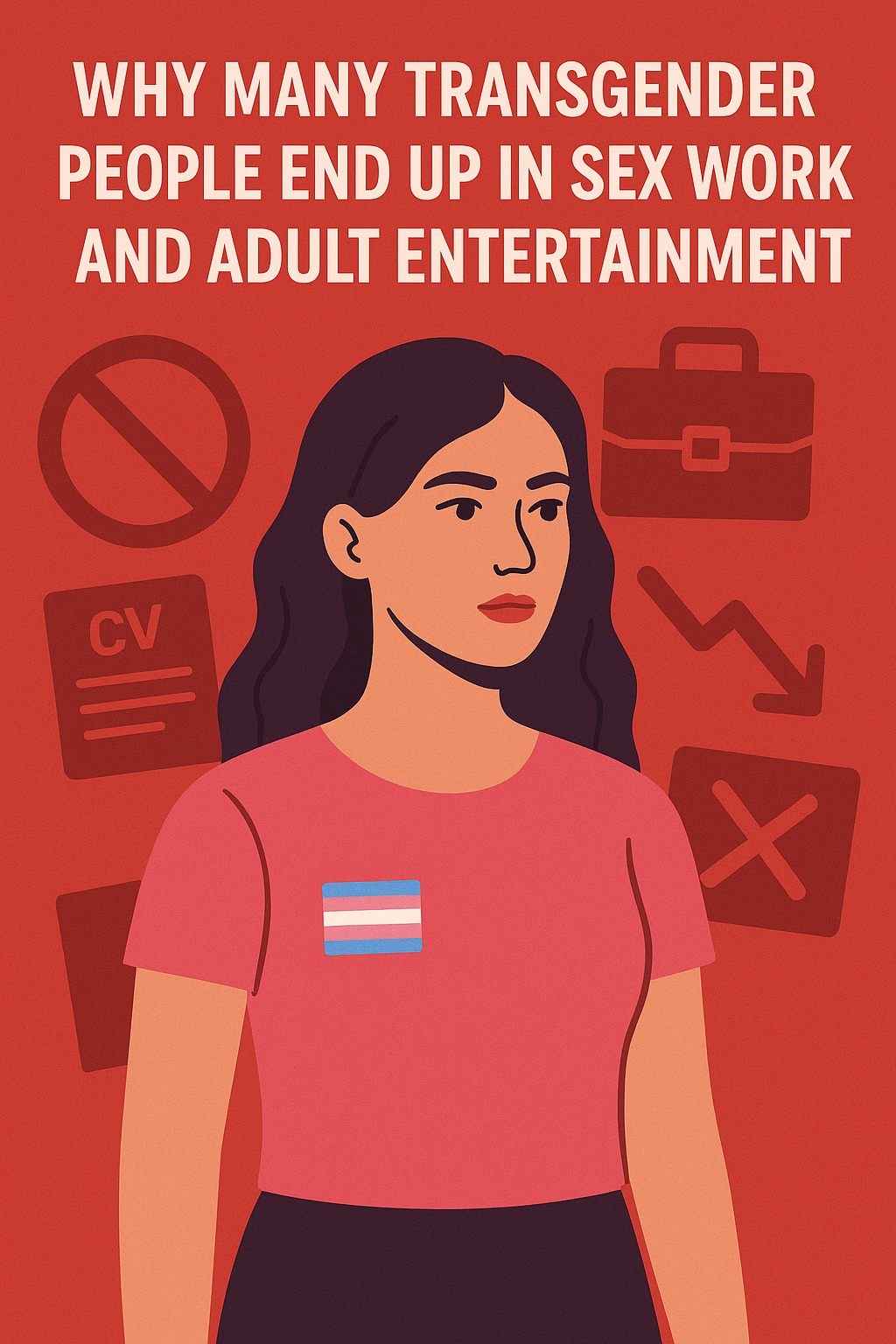Why Many Transgender People End Up in Sex Work and Adult Entertainment: A Deep Dive
In this comprehensive article we explore the structural reasons—employment discrimination, transition-related costs, stigma, and social exclusion—that push many transgender people toward sex work or adult entertainment. We also examine the consequences and offer practical solutions for change.
Keywords: transgender employment discrimination, trans sex work, adult entertainment industry, transgender survival economy, workplace prejudice, gender-affirming care cost
- Introduction
- Employment Discrimination and Economic Marginalisation
- Transition-Related Costs and Financial Pressure
- Stigma, Social Exclusion and the Demand Side
- Adult Entertainment vs. Conventional Employment: Agency and Risk
- The Structural Link: Discrimination → Unstable Work → Adult Entertainment
- Consequences for Health, Well‑being and Life Course
- What Needs to Change? Pathways to Equity
- Conclusion
Introduction
In societies around the world, transgender people face disproportionate barriers to stable employment, fair wages and safe working conditions. These systemic obstacles often push some into the adult entertainment sector or sex work—not because they want to, but because they feel they have little realistic alternative. By examining the root causes—employment discrimination, economic marginalisation, transition‑related expenses, stigma and prejudice—we can start to understand why the link between transgender identity and involvement in sex work or adult entertainment exists. We can also explore how to break the cycle.
Employment Discrimination and Economic Marginalisation
Barriers to Hiring and Career Advancement
Multiple studies show that transgender people are, across jurisdictions, far more likely to experience hiring discrimination, workplace harassment and termination due to their gender identity. These discriminative practices mean that strong CVs, relevant education or experience often do not lead to meaningful employment. The job market becomes a fiercer struggle, and many trans people end up unemployed or under‑employed.
Poverty, Unemployment and the Survival Economy
Economic marginalisation follows naturally. When wages in conventional employment are blocked or inadequate, the “adult entertainment” sector can appear as one of the few viable income avenues. Surveys and nonprofit reports indicate that a significant portion of transgender individuals will engage in sex work at some point in their lives, often as a survival strategy.
Transition‑Related Costs, Medical Needs and Financial Pressure
Transgender individuals often carry considerable financial pressure due to gender‑affirming medical care, hormone therapy, surgeries, or simply the cost of living openly as their gender. Simultaneously, being excluded from good paying jobs reduces capacity to cover those costs. In many cases adult entertainment or sex work is used to finance transition‑related healthcare, surgeries or to cover basic living expenses when other work options are unavailable.
Stigma, Social Exclusion and the Demand Side
Social Exclusion and the “Push” Factor
Transgender people often face rejection from families, educational disadvantage, housing instability and mental health strain—all consequences of transphobia and social stigma. These factors create a “push” into survival sex work. Qualitative research indicates that transgender sex workers report lower levels of social support, higher levels of stigma and violence compared with trans individuals not engaged in sex work.
The “Pull” or Structural Demand Side
Adult entertainment and sex work industries may actively target or draw transgender individuals due to fetishisation, exoticisation or niche markets that view transgender identity as a marketing hook. This does not trivialise the agency of trans people, but situates their choices within structural realities rather than purely individual “freedom of choice”.
Adult Entertainment vs. Conventional Employment: Agency and Risk
It is important to challenge simplistic narratives of “victimhood” or “choice”. For some transgender individuals, adult entertainment or sex work can provide income, autonomy, flexibility, and even affirmation. Some trans sex workers view their work as entrepreneurial and assertive, in contrast to highly constrained conventional labour markets.
However, this flexibility comes bundled with elevated risks: increased exposure to violence, HIV/STI risk, substance use, mental‑health challenges and legal vulnerability. While adult entertainment can appear as an alternative route, it is seldom a risk‑free substitute for stable, sustainable employment.
The Structural Link: Discrimination → Unstable Work → Adult Entertainment
Putting together the strands:
- Employment discrimination and lack of access to fair wages block access to many mainstream jobs.
- Transition‑related costs and pressing survival needs create acute financial pressure.
- Social exclusion (family rejection, homelessness, mental‑health burden) reduces safety nets.
- The adult entertainment sector offers one of the more accessible income streams—especially when traditional job routes fail.
This structural pathway explains why the adult entertainment industry becomes a de facto fallback when conventional employment is blocked, pay is unequal, and the cost of being oneself is high.
Consequences for Health, Well‑being and Life Course
Engagement in sex work or adult entertainment under conditions of economic necessity, stigma and instability has measurable adverse consequences:
- Mental health outcomes: higher rates of distress, substance use and suicidal behaviour among transgender people with a history of sex work.
- Physical health risks: elevated STI/HIV risk, uncontrolled hormone use and limited access to healthcare.
- Life trajectory: being channelled into precarious labour can limit long‑term economic mobility and deepen marginalisation.
What Needs to Change? Pathways to Equity
If the goal is to reduce the number of transgender people compelled to work in adult entertainment out of necessity, several domains demand action:
Inclusive Employment Practices
Employers and policymakers must actively dismantle discriminatory hiring practices. Anti‑discrimination protections, inclusive workplace cultures, trans‑affirming HR policies, and targeted job training for transgender people can help open mainstream employment.
Economic Support for Transition, Healthcare & Affirmation
Reduced barriers to gender‑affirming care, subsidies, insurance coverage, and social welfare supports can ease the financial burden that often pushes trans individuals into risky labour.
Education, Skills & Career Pathways
Access to education, vocational programmes and career counseling tailored to life course needs—including recognition of career gaps due to transition or recovery—can expand options.
Representation & Visibility
Visible transgender professionals in a wide variety of sectors help create pathways, break stereotypes and normalise trans presence in mainstream jobs.
Safety Nets & Housing Security
Addressing homelessness, family rejection, housing discrimination and mental health support will reduce the “push” forces into survival sex work. Social services must be trans‑competent, trauma‑informed and accessible.
De‑stigmatisation of Sex Work & Trans Realities
Recognising sex work as labour and reducing stigma attached to it—as well as the stigma attached to transgender identity—can improve safety, access to healthcare and dignity for those in adult entertainment. At the same time, framing it as one possible route, not the default, is vital.
Conclusion
The reason many transgender people find themselves in prostitution, adult entertainment or sex work is less about individual “choice” and far more about structural constraints, exclusion, survival need and lack of safe, viable alternatives. By acknowledging the root causes—employment discrimination, transition‑cost burden, stigma, homelessness—and implementing inclusive, systemic solutions, we can shift the narrative. Transgender people should not have to choose between invisibility, survival sex work or marginalised labour. They should have the same opportunities, respect and protections that allow them to pursue fulfilling, safe, sustainable work.


